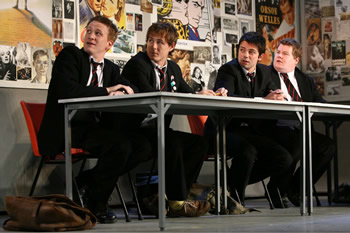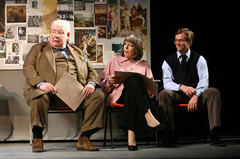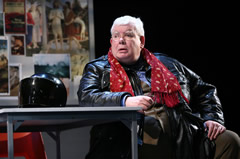
An Unsentimental Education
By Caridad Svich
The History Boys
By Alan Bennett
Broadhurst Theatre
235 W. 44th St.
Box office: (212) 239-6200
Alan Bennett's comedies are deceptively
simple on the surface. They live in an ambiguous register where
high and low comic tonalities co-exist without highlighted demarcation,
and where the aspect of tragedy can take over at any moment. It's
tempting to call Bennett's writing Chekhovian, but there is an
odd reserve to his work (especially his later plays) that is intrinsically
English. Perhaps this is why, aside from the Talking Heads
monologues seen several seasons ago at the Minetta Lane Theatre
in New York City, his major plays have not received significant
productions in the United States. The History Boys may
indeed change that.
This affectionate, bittersweet work, set
at a minor public boys' school in the north of England during
the Thatcher years, is currently playing a 20-week engagement
at the Broadhurst Theatre, with the original British cast from
Nicholas Hytner's Royal National Theatre production. It is full
of grace and fluidity, notwithstanding its large cast (twelve
principals and five ancillary roles) and broad canvas. It looks
at the lives of young men as they are coming of age, and at the
academic political maneuverings around them, covering some familiar
terrain (there are strong echoes of Peter Weir's Dead Poets
Society and the classic Goodbye Mr. Chips). Bennett
has something far more ambitious in mind in telling this story,
though.
The History Boys is a deeply funny,
heartbreakingly anguished exploration of a societal shift initiated
in Thatcher's administration, from an education system devoted
to the values of culture and knowledge to one driven by results
and numbers. Focusing on eight Oxbridge scholarship candidates,
the play pits an older, progressive teacher named Hector (played
with wit, gravity and force by Richard Griffiths) against Irwin,
a rigid but cunning young teacher with a gauche sensibility (played
by Stephen Campbell Moore). The ruthless but not unkind Headmaster
(Clive Merrison) initially takes no sides and only wants his students
to get ahead.
 Oxford
and Cambridge are the glamorous academic destinations offered
if the young men play their exams right, and the assumption is
that a bit of judicious lying is necessary. Irwin is brought in
to teach the boys to cut corners, to dress up history in their
essay-writing, not necessarily retaining what they learn but simply
using it to convenient advantage. Hector is the teacher devoted
to infusing his students with a love of books, words, and even
the necessary un-necessaries of life (bad pop songs, old melodramatic
films and kitsch), whereas Irwin is devoted to ladder-climbing,
whatever the cost.
Oxford
and Cambridge are the glamorous academic destinations offered
if the young men play their exams right, and the assumption is
that a bit of judicious lying is necessary. Irwin is brought in
to teach the boys to cut corners, to dress up history in their
essay-writing, not necessarily retaining what they learn but simply
using it to convenient advantage. Hector is the teacher devoted
to infusing his students with a love of books, words, and even
the necessary un-necessaries of life (bad pop songs, old melodramatic
films and kitsch), whereas Irwin is devoted to ladder-climbing,
whatever the cost.
For students who do not possess the necessary
family connections or upper-class standing to smooth access to
Oxbridge, cutting corners and sticking to results (regardless
of the quality of the content) is seen by the Headmaster as the
only way to move forward. The characters apply this attitude to
society's progress as well, so it reads as Bennett's gloss on
Thatcher's England. The play is a lament, however breezy on its
surface, for the lost values of a past time.
Complicating Bennett's thesis, and typical
of the ambiguity of his writing, is the fact that Hector, the
beloved teacher, is a pedophile who has been "innocently abusing"
his students for years. The plot pivots on Hector's "outing" and
ultimate dismissal from his position. Bennett's sympathy with
him--and all his other characters as well, even the smug Headmaster
and the dull but astute Irwin--is a sign of great empathy. The
playwright does not belittle the troubling aspects of Hector's
deviance; in fact, he calls into question the various levels of
sexual awakening demonstrated in the play. Central to the somewhat
friendly academic rivalry between Hector and Irwin is the unrequited
love triangle between Posner, a late-blooming gay student (played
with effortless grace by Samuel Barnett), Irwin, and another student
named Dakin, a handsome, bisexual go-getter (played with appropriately
arrogant charm by Dominic Cooper). Posner is not-so-secretly infatuated
with Dakin; Dakin is playing the field and has his sights set
on Irwin; Irwin is attracted to Dakin but reluctant to act upon
his attraction. Both Posner and Irwin want to be Dakin: the object
of everyone's affection, the easygoing "star" of the school.
One could easily assume that all Bennett
does is show the vagaries of sexual awakening in late adolescence
(Irwin is only a few years older than the students), but the fact
that the play centers in large part on the manner in which Hector,
the tradition-bearer, is removed from his post signals that Bennett
also wants to address the ingrained, long-standing abuse suffered
by boys at public schools in England--the casual legacy of damage
inherited by generations. That the play does this without seeming
to have an ax to grind is what keeps its tension alive.
 The
last several seasons have seen several dramas dealing directly
or tangentially with pedophilia (Noah Haidle's Mr. Marmalade,
Bryony Lavery's Frozen, John Patrick Shanley's Doubt,
to name a few). Yet Bennett's delicate, complex, and unbearably
light approach to the subject is particularly refreshing and disturbing.
He manages to weave the subject as part of the greater fabric
of education, asking more general questions about what young people
ought to be taught and how they should be socialized--which gives
the play considerable breadth. Griffiths portrays Hector as a
man completely outmoded in dress and manner but nevertheless crucially
aware of his outmodedness. As he loses himself and yet tries to
continue to impart his love of Auden, Hardy and Orwell to his
spirited charges, he captures the devastating realization that,
in this new world (Thatcherite England, with its newly installed
National Curriculum), the love of learning will be replaced by
the love of efficient progress. As Irwin tells his students, "History
nowadays is not a matter of conviction. It's a performance. It's
entertainment. And if it isn't, make it so."
The
last several seasons have seen several dramas dealing directly
or tangentially with pedophilia (Noah Haidle's Mr. Marmalade,
Bryony Lavery's Frozen, John Patrick Shanley's Doubt,
to name a few). Yet Bennett's delicate, complex, and unbearably
light approach to the subject is particularly refreshing and disturbing.
He manages to weave the subject as part of the greater fabric
of education, asking more general questions about what young people
ought to be taught and how they should be socialized--which gives
the play considerable breadth. Griffiths portrays Hector as a
man completely outmoded in dress and manner but nevertheless crucially
aware of his outmodedness. As he loses himself and yet tries to
continue to impart his love of Auden, Hardy and Orwell to his
spirited charges, he captures the devastating realization that,
in this new world (Thatcherite England, with its newly installed
National Curriculum), the love of learning will be replaced by
the love of efficient progress. As Irwin tells his students, "History
nowadays is not a matter of conviction. It's a performance. It's
entertainment. And if it isn't, make it so."
In a disarming way, Bennett, by concentrating
his empathy on Hector while both mocking and admiring the resolve
of the likes of Irwin, makes a case both for and against. Irwin
stands for that new brand of faux historians who turn TV celebrities
on the strength of their ability to bend and even distort aspects
of history. Throughout the drama, Bennett bemoans such substitutions
of glib, half-learned information for substantial, earned knowledge.
However, he also casts a decidedly affectionate eye on the students
who manage to appreciate and incorporate both schools of thought.
His most chastising and unexpected indictment is of the appealingly
sensitive yet ultimately wayward Posner, whose dilemma of unrequited
love is poignantly captured when he sings "Bewitched (bothered
and bewildered)" from Kismet early on. Posner's fate,
which I will not reveal here, is cruel. Bennett remarks through
the voice of the school's lone female teacher, Mrs. Lintott (played
with remarkably dry wit by Frances de la Tour), that Posner, the
student who most took all his lessons to heart (both Hector's
and Irwin's), was the one least capable of living in society.
Despite his obvious allegiance to Hector,
Bennett seems to recognize that loving words and knowledge too
much can be a person's ruin. Thus, ultimately, The History
Boys is about the decidedly unsentimental education offered
by life.
